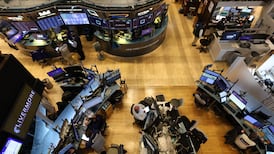European stocks climbed on Monday, as investors looked ahead to a busy week of central bank meetings in which policymakers are poised to scrutinise the high rates of inflation across major economies.
The regional Stoxx 600 index ticked up 0.4 per cent in morning trading, while London’s FTSE 100 rose 0.2 per cent and Germany’s Dax drifted 0.7 per cent higher.
In Asia, Hong Kong’s Hang Seng slipped 0.2 per cent and Tokyo’s Nikkei 225 rose 0.7 per cent.
Performance
The muted performance comes before a trio of highly anticipated central bank meetings this week. The US Federal Reserve, the European Central Bank and the Bank of England are all set to make policy announcements.
Investors are grappling with almost daily updates on the effectiveness of vaccines against the Omicron coronavirus variant, the latest of which - published by the UK Health Security Agency on Friday - found that booster shots could be up to 75 per cent effective against symptomatic infection from the new strain.
That coincided with the emergence of “reassuring” data from South Africa, with Dr Harsha Somaroo, president of the country’s Public Health Association, suggesting that vaccination plus immunity built up from previous infection provide a degree of protection against severe symptoms.
A winter resurgence of Covid-19 further complicates matters for the European Central Bank’s governing body, which meets later this week amid growing pressure to reduce its monetary stimulus. Surging energy prices and supply chain bottlenecks pushed euro zone inflation to a record 4.9 per cent in November, well above the ECB’s 2 per cent target.
“It’s the perfect storm [in terms of] inflation volatility,” said Frederik Ducrozet, global macro strategist at Pictet. “The difficulty for the ECB is that it does not want to overreact” to factors outside its control, such as supply chain issues that have helped drive up inflation.
Across the Atlantic, US stocks last week posted their best run since February, with the broad-based S&P 500 index closing at a record high, even after a report showed consumer prices increased by 6.8 per cent in November from a year ago - the fastest annual pace in nearly 40 years
Policy
.
That marked a significant pick-up from the 6.2 per cent rate in October, and led to calls over the weekend from Democratic party moderates for the Fed to tighten monetary policy sooner than planned.
Jake Auchincloss, a Democrat from Massachusetts and member of the House of Representatives financial services committee, which oversees monetary policy, told the Financial Times that the US central bank - an independent body - needs to act more quickly to tighten monetary policy.
The yield on the 10-year US Treasury note inched up to 1.49 per cent as the price of the benchmark debt instrument fell. Germany’s 10-year Bund yield was flat at minus 0.34 per cent.
In currencies, the dollar index, which tracks the performance of the greenback against six others, was up 0.25 per cent. Sterling, meanwhile, was down 0.3 per cent. – Copyright The Financial Times Limited 2021














